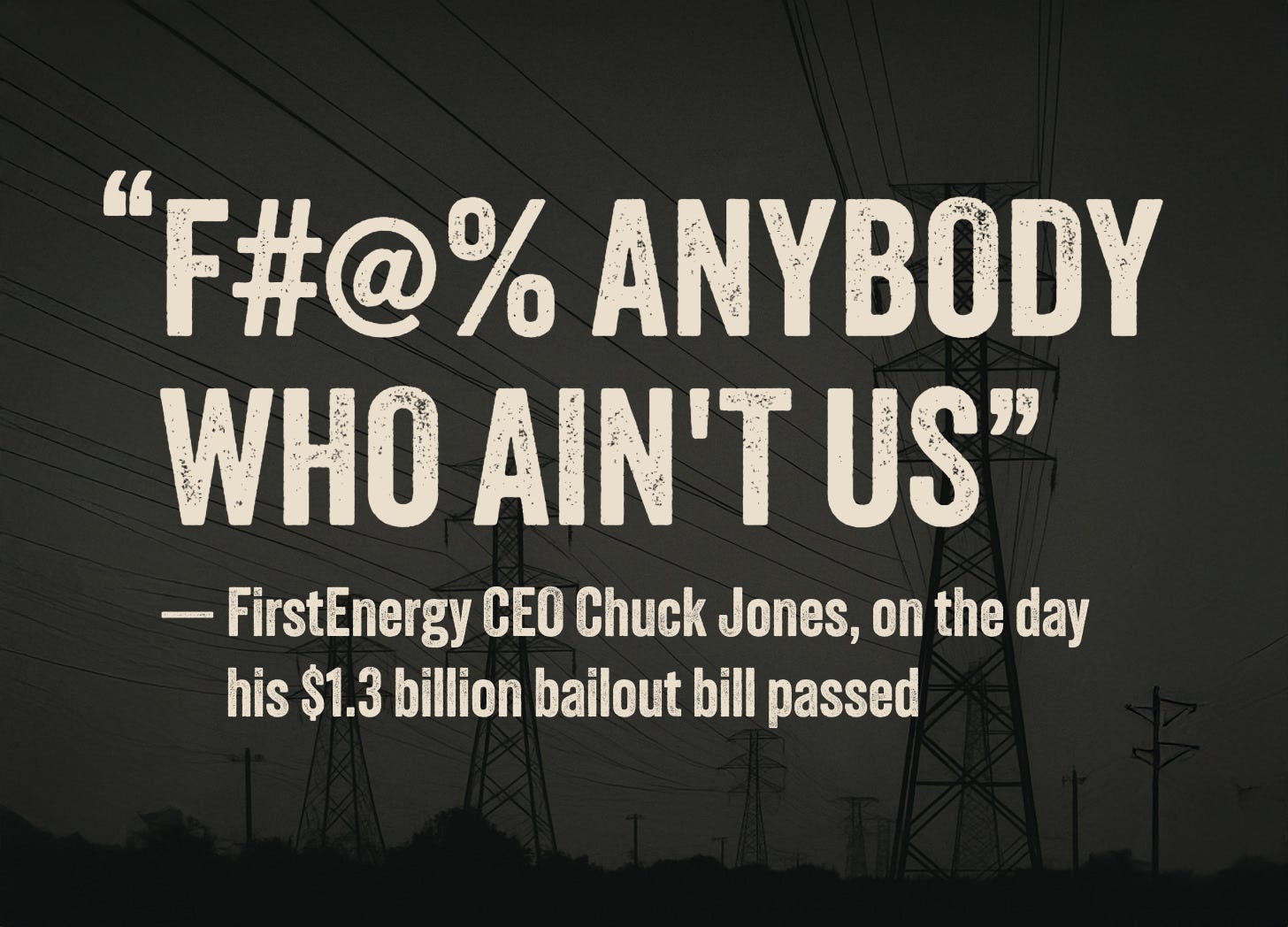Introduction
Charles ("Chuck") Jones epitomizes the bailout-buying utility executive. As CEO of utility giant FirstEnergy, he flew the future speaker of Ohio's House of Representatives on the company's jet to Donald Trump's inauguration in 2017. Over posh dinners at The Palm and Charlie Palmer Steak, the executive and the politician plotted to have FirstEnergy secretly pay more than $60 million to the speaker's allies in exchange for the House leader advancing a $1.3-billion bailout of the utility's uneconomic power plants. On the day House Bill 6 passed, Chuck gloated about his team's victory: "Fuck anybody who ain't us."
Chuck's is a tale about power--both electric and political. Imagine gambling $60 and getting a $1,300 return. Now imagine adding six zeros to each number and you begin to appreciate the audacity, greed, and political might of these monopolies. In this case, Chuck wasn't banking on blind luck for his big win. To assure a $1.3-billion payout, FirstEnergy's team bribed politicians, physically harassed bailout opponents, hired high-priced lobbyists, and blanketed the airways with xenophobic threats about China taking over Ohio's energy resources.
It took three years for federal prosecutors--using home raids, wiretaps, and undercover agents--to expose this pay-to-play scheme. The consequences to date have been severe, and more indictments are expected. To avoid jail, one of FirstEnergy's lobbyists committed suicide in the woods near his home. Two others pled guilty. FirstEnergy fired Chuck, admitted to bribery, and paid a $230-million fine. A federal judge in June 2023 sentenced the Republican speaker to twenty years in prison. Almost a year later, Ohio's indicted utility regulator hanged himself, the second fatality traced to FirstEnergy's racketeering.
Chuck Jones is hardly the only scandal-prone CEO. Anne Pramaggiore, Commonwealth Edison's leader, was found guilty in 2023 of distributing $1 million to allies of Illinois' speaker in exchange for legislation worth more than $150 million to her power company. Arizona Public Service's chairman, Don Brandt, used dark-money political groups to install his allies as utility regulators. Eric Silagy, Florida Power & Light's leader, bribed a ghost candidate to siphon votes away from a state senator who had proposed legislation that threatened the utility's revenue.
Pay-to-play power corruption proliferates, and it is a drag on the economy, a threat to the rule of law, and a barrier to tackling climate change.
Why This Matters to You
You're paying for Chuck's scheme twice over. First, through the bailout that Ohio ratepayers will fund through higher electricity bills. Second, through your federal taxes that paid for the FBI investigation, the prosecutions, and the ongoing cleanup. But the real cost goes beyond money—when utilities can buy politicians and rig the system, it blocks cleaner, cheaper energy from reaching your home and undermines faith in democratic institutions. Chuck Jones thought he could game the system because, until recently, executives like him usually could.
Next Week
Chuck Jones isn't alone. Discover how utility CEOs from Illinois to Arizona to Florida have turned corruption into a business model—and why this crisis is accelerating as new technologies threaten their monopoly stranglehold on America's power grid.




